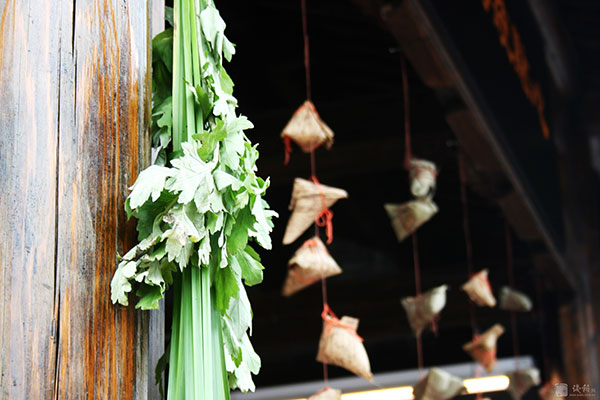RESOURCES
Source: Chinaculture.org

Poet Qu Yuan in a painting.
The Duanwu or Dragon Boat Festival, which is celebrated on the fifth day of the fifth month of the Chinese lunar calendar, falls on June 20 this year.
It is one of the oldest festivals, not only in China but also throughout the world, with a history of more than 2,000 years.
The Dragon Boat Festival commemorates the death of Qu Yuan, a patriot poet during the Warring States Period (475-221 BC), who committed suicide by flinging himself into the Miluo River in Central China's Hunan province after his mother kingdom fell into enemy rule.
Legend holds that people in boats raced to the site where he drowned and threw in zongzi (glutinous rice wrapped in reed leaves) so fish wouldn't feed on Qu's body.
Since then, the fifth day of the fifth month on the lunar calendar is celebrated as the Dragon Boat Festival. People hold boat races and prepare zongzi in memory of Qu's righteousness and his beautiful poems.

Different varieties of zongzi tempt the palate.
1. Eating Zongzi
Also called glutinous rice dumpling wrapped in reed or bamboo leaves, zongzi is an essential Dragon Boat Festival food, but tastes vary between the north and south of China.
In the north people favor sweet zongzi and jujube is used as a filling, while in the south zongzi takes different shapes and various fillings, such as fresh meat, egg yolk, sweetened bean paste or ham.

Competitors row a dragon boat during a race in the Taohuatan Scenic Area of Jingxian county, East China's Anhui Province, June 1, 2014.
2. Dragon boat racing
Dragon boat racing is an indispensable part of the festival with the boats so named because the fore and stern are in the shape of a Chinese dragon.
Legend has it that the race originates from the idea that people rowed boats to seek Qu Yuan's body after he drowned.

Students chant poems at Qu Yuan Temple in Zigui county, Central China's Hubei province, June 8, 2013.
3. Poem chanting
In ancient times the government of Zhaoxian county, North China's Hebei province held a gathering at the southern gate during the Dragon Boat Festival. Scholars were invited to a banquet where they could drink and write poems.
The activity was called "Ta Liu" or "Stepping the willow" and later developed into poem chanting.

People hang mugwort leaves and calamus on doors and windows to repel insects and moths.
4. Hanging auspicious leaves
It is said that the fifth lunar month is considered a "poisonous" one in the Chinese farmer's almanac because insects and pests are active and it is also high season for people catching infectious diseases.
During the Dragon Boat Festival people in southern China put mugwort leaves and calamus on the doors or windows to keep insects out of their homes. The leaves are believed to have curative properties.

A child with scented sachets in Bozhou city, East Chin's Anhui province, May 11, 2014.
5. Wearing scented sachets and five-color silk thread
In the north, people believe that wearing scented sachets protects children from evil. The young decorate their clothes with small pouches made from colorful silk cloth with five-color silk thread.
Another custom is to tie thread around a child's wrists, ankles and neck. Five-color thread holds special significance in China in that it is thought to contain magical and healing properties. Children are not permitted to speak while parents tie the thread for them, neither are they allowed to remove it until after the first summer rainfall when they throw the thread into the river. This is thought to protect them from plague and disease.

Villagers in Xitang, East China's Zhejiang province, tuck in to the "Five Yellow", June 20, 2012.
6. Eating Five Yellow
People have the custom of eating the "Five Yellow" to ward off the "Five Poisons" particularly in East China's Jiangsu and Zhejiang provinces. The "Five Yellow" refers to yellow croaker, cucumber, rice field eel, salted duck egg and realgar wine, made from an arsenic sulfide mineral.
As the weather grows increasing hotter with more rainfall, insects come out in nature and people can easily get sick. The Dragon Boat Festival is a day for people to ward off illness and insects. The "Five Poisons" are snake, centipede, spider, gecko and toad.

Zhong Kui.
7. Hanging an image of Zhong Kui
Zhong Kui was an exorcist. His picture, fierce-looking and brandishing a magic sword, used to be hung in Chinese houses in order to scare away evil spirits and demons, especially during the Dragon Boat Festival, in the area between the Yangze and Huaihe rivers.